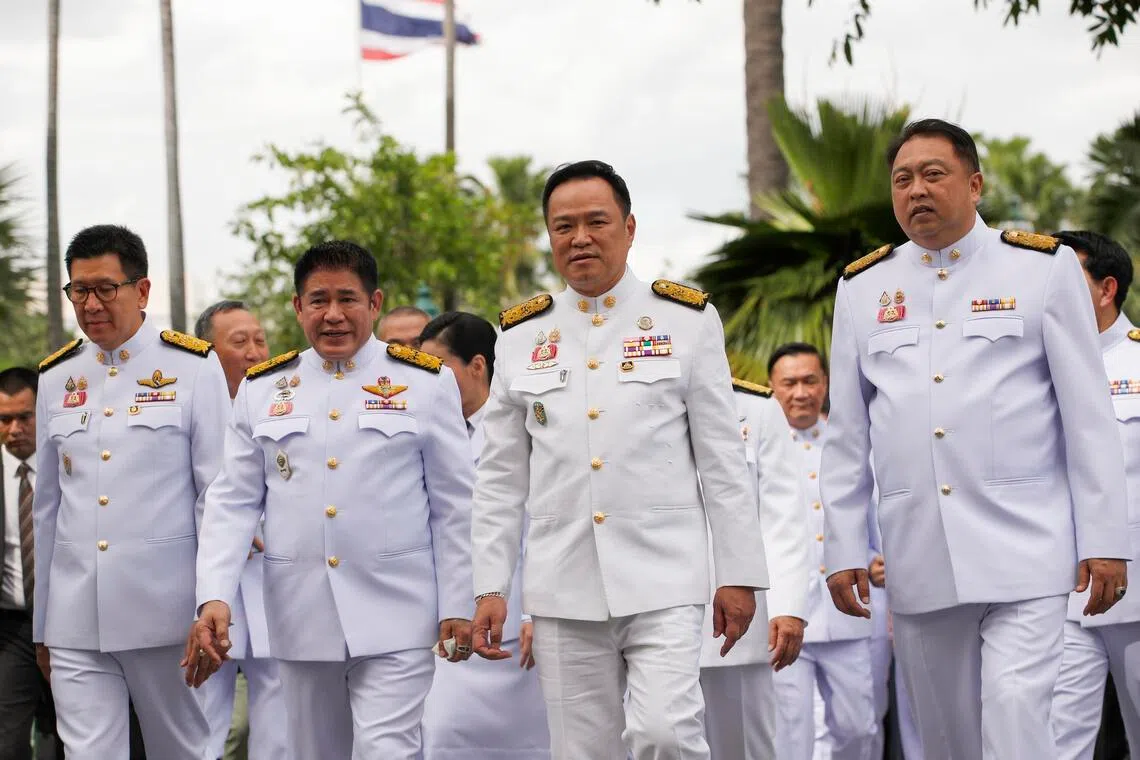Thailand’s third government in two years sworn in after turmoil
Sign up now: Get insights on Asia's fast-moving developments

Thai Prime Minister Anutin Charnvirakul (second from right), along with members of the Cabinet, arrives at the swear-in ceremony at the Government House in Bangkok, Thailand, on Sept 24.
PHOTO: EPA
BANGKOK – Thailand’s new Prime Minister Anutin Charnvirakul and his Cabinet were sworn into office on Sept 24, paving the way for the country’s third administration in two years to outline its policy agenda before fresh elections are called in the coming months.
The prime minister and 35 ministers took the oath of allegiance before King Maha Vajiralongkorn in a traditional ceremony at the royal palace in Bangkok.
Mr Anutin will hold his first Cabinet meeting on Sept 24, which will likely clear appointments of some officials and a policy statement to be presented to the Parliament next week.
The swearing-in marked the culmination of a weeks-long government formation process triggered by the Constitutional Court’s dismissal of former premier Paetongtarn Shinawatra over an ethics violation.
Mr Anutin’s conservative Bhumjaithai Party will lead a minority government, having relegated Ms Paetongtarn’s rival Pheu Thai Party to the opposition.
Mr Anutin, 59, has pledged to dissolve the lower house of Parliament within four months after delivering the policy statement under a deal with the opposition People’s Party, which backed his bid for premiership without joining the coalition. The dissolution will pave the way for an early election to be held within 60 days.
Fitch Ratings downgraded the country’s sovereign debt outlook to negative from stable, citing increasing risks to Thailand’s public finance outlook from prolonged political uncertainty combined with growth headwinds from slowing global demand, a delayed tourism recovery and household deleveraging. It retained Thailand’s ‘BBB+’ rating.
The new government is set to prioritise short-term economic stimulus
Mr Anutin’s Cabinet includes seasoned bureaucrat Ekniti Nitithanprapas as deputy prime minister and finance minister; Ms Suphajee Suthumpun, former chief executive of hotel operator Dusit Thani as commerce minister; and Mr Auttapol Rerkpiboon, a former chief executive of energy giant PTT, as energy minister.
The move to put technocrats in charge
Thailand’s export-reliant economy is forecast to grow just about 2 per cent in 2025, as it faces headwinds of higher US tariffs and a strong currency. The baht, which earlier in September hit a four-year high, has gained about 7 per cent so far in 2025, becoming Asia’s second-best performing currency. Bloomberg


